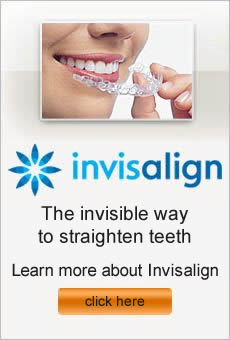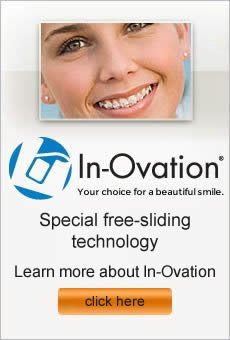If you or your child have a new set of braces, you will want to make sure to take proper care of your new orthodontia to ensure the treatment phase is efficient and successful.
Initially, you will want to choose a soft food diet for a few days to allow time for the sensitivity to subside. Once your mouth has adjusted to your new hardware, there are some simple guidelines you can follow to make sure your braces do their job effectively:
- Avoid chewing hard or sticky foods such as ice, some candies, gum, hard chips, and popcorn kernels that can damage your braces.
- Cut chewy meats off the bone, cut hard fruits and vegetables into small bites, and tear or cut chewy or hard bread into bite-size pieces.
- Refrain from chewing on fingernails, pens, pencils or other hard objects to avoid damaging your orthodontia.
- Wear a protective mouth guard when participating in contact sports and alert your orthodontist immediately if your braces are damaged in any way while playing.
- Brush and floss regularly to maintain healthy teeth and gums while undergoing orthodontic treatment.
- To maintain your gum health during and after having braces, floss using either a floss designed for braces or regular floss used with a floss threader.
- Always wear rubber bands, retainers, or any other appliances as recommended by your orthodontist to ensure your teeth and jaw move into the correct position.
Taking care of your braces takes very little work, but offers many rewards. Maintaining the functionality of your braces will result in faster treatment time and a lifetime of straight, beautiful smiles.
Sherman Oaks Orthodontist
If you or a loved one recently began orthodontic treatment, you might be discovering that braces can lead to some level of discomfort. Some patients experience soreness of the cheeks, lips and tongue, while others have an overall ache in the teeth and jaw. Some patients develop moderate to severe headaches after braces application and/or after each adjustment.
If you are experiencing these headaches, you can take steps to get some relief.
- Over-the-counter medications that relieve pain and also reduce swelling are excellent choices to treat braces-related headaches. Ibuprofen is an excellent choice, as is naproxen sodium.
- Applying a cool cloth, ice pack, or bag of frozen vegetables (such as corn or peas) to your head, face and neck can relieve a headache.
- Drink something cool, like a milk shake, frozen yogurt or iced drink, slowly, so as not to get a “brain freeze.” Sometimes a beverage with a little caffeine can help alleviate a headache.
- Use your hands to massage your temples, neck and head. If you’re able, ask a friend or spouse to massage it for you. If possible, regular visits to a massage therapist can help reduce the severity of a headache.
- Avoid crunchy or chewy foods while your teeth ache. This can make your headache worse.
- Seek out pressure points, like those in the webbing between your thumb and forefinger, and apply pressure to help a headache go away.
- Spend time in a darkened, quiet room. Avoid bright lights and loud noises while your headache is present.
If your headaches persist, talk to your orthodontist for other tips to manage them. Your orthodontist should know what to do to help you deal with your orthodontia-related headaches.
Sherman Oaks Orthodontist



